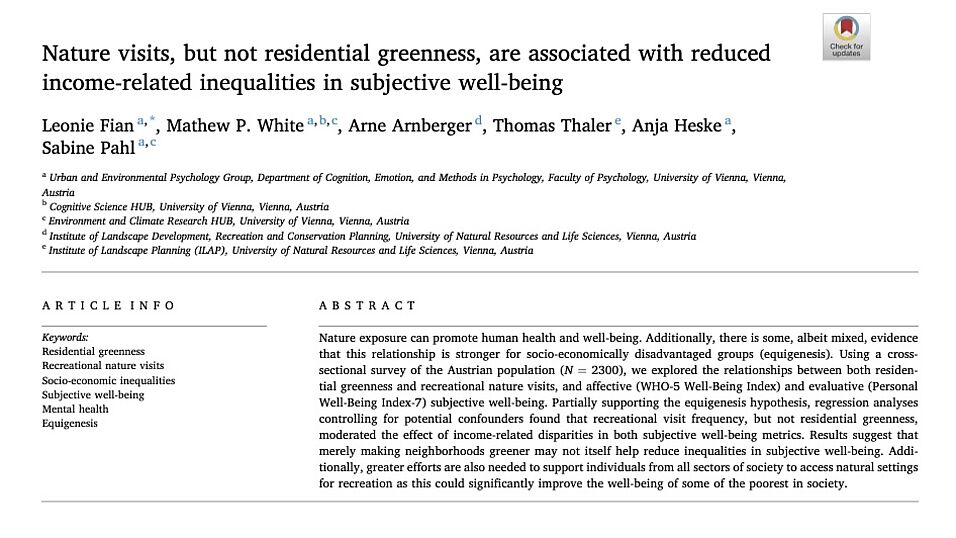Abstract
Nature exposure can promote human health and well-being. Additionally, there is some, albeit mixed, evidence that this relationship is stronger for socio-economically disadvantaged groups (equigenesis). Using a cross-sectional survey of the Austrian population (N = 2300), we explored the relationships between both residential greenness and recreational nature visits, and affective (WHO-5 Well-Being Index) and evaluative (Personal Well-Being Index-7) subjective well-being. Partially supporting the equigenesis hypothesis, regression analyses controlling for potential confounders found that recreational visit frequency, but not residential greenness, moderated the effect of income-related disparities in both subjective well-being metrics. Results suggest that merely making neighborhoods greener may not itself help reduce inequalities in subjective well-being. Additionally, greater efforts are also needed to support individuals from all sectors of society to access natural settings for recreation as this could significantly improve the well-being of some of the poorest in society.
The paper is open access and can be read in full here: https://www.sciencedirect.com/science/article/pii/S1353829224000030
Leonie Fian, first author on the paper, was also interviewed by ORF: https://science.orf.at/stories/3223495/
Further media coverage of the paper:
- https://science.apa.at/power-search/14169811967216142277
- https://science.apa.at/power-search/5231929242543908414
- https://www.sn.at/panorama/wissen/studie-wohlbefinden-einmal-woche-natur-euro-monat-153026776
- freizeit.at/fit-gesund/macht-geld-gluecklich-mehr-lebenszufriedenheit-tipps/402778354
- https://www.uni.at/uni-fh/menschen-mit-niedrigerem-einkommen-profitieren-besonders-von-natur/
- https://www.studium.at/naturbesuche-steigern-wohlbefinden-primaer-benachteiligten
- https://www.medmedia.at/relatus-med/naturbesuche-steigern-wohlbefinden/
- https://www.spektrum.de/news/zeit-in-der-natur-gleicht-einkommensunterschiede-aus/2207859
- www.msn.com/de-at/nachrichten/other/warum-gl%C3%BCck-nichts-kostet-und-die-natur-heilsam-wirkt/ar-BB1ihlJ7
- cupidshealth.com/lower-income-people-benefit-most-from-engaging-with-the-natural-environment/
- https://www.greenprophet.com/2024/02/nature-is-good-for-poor-people/

